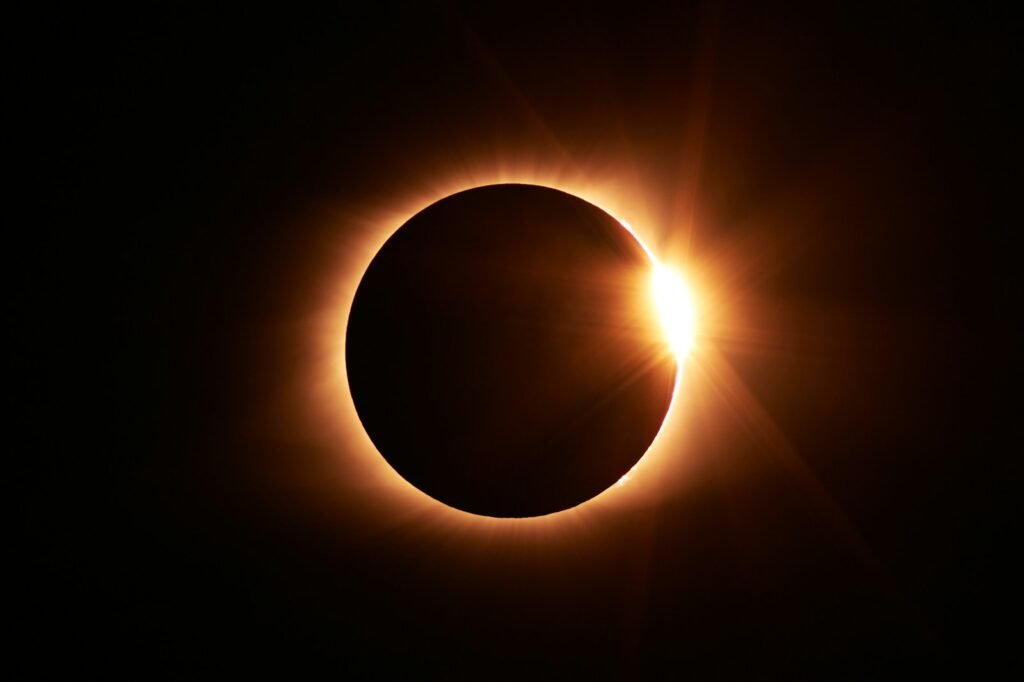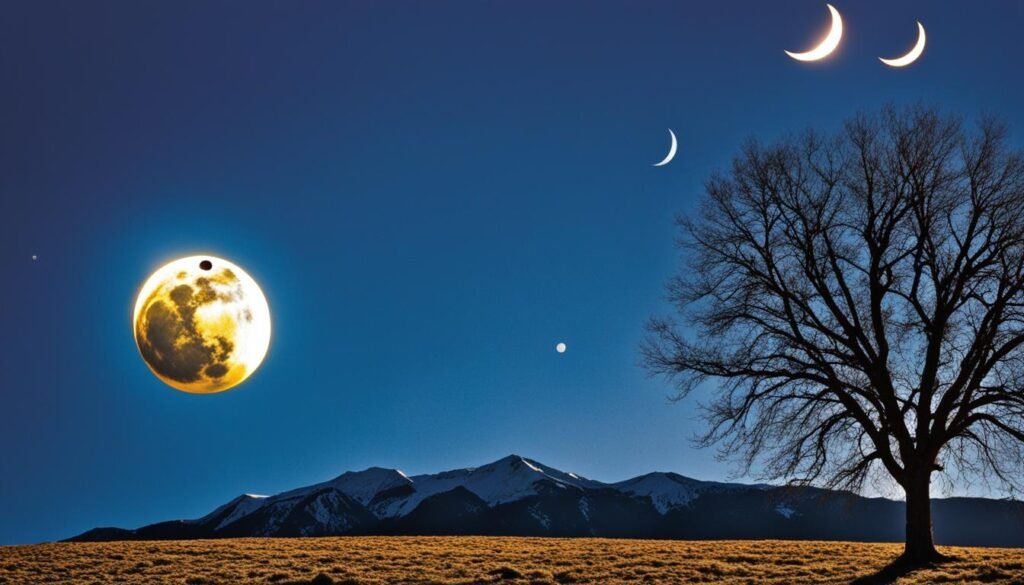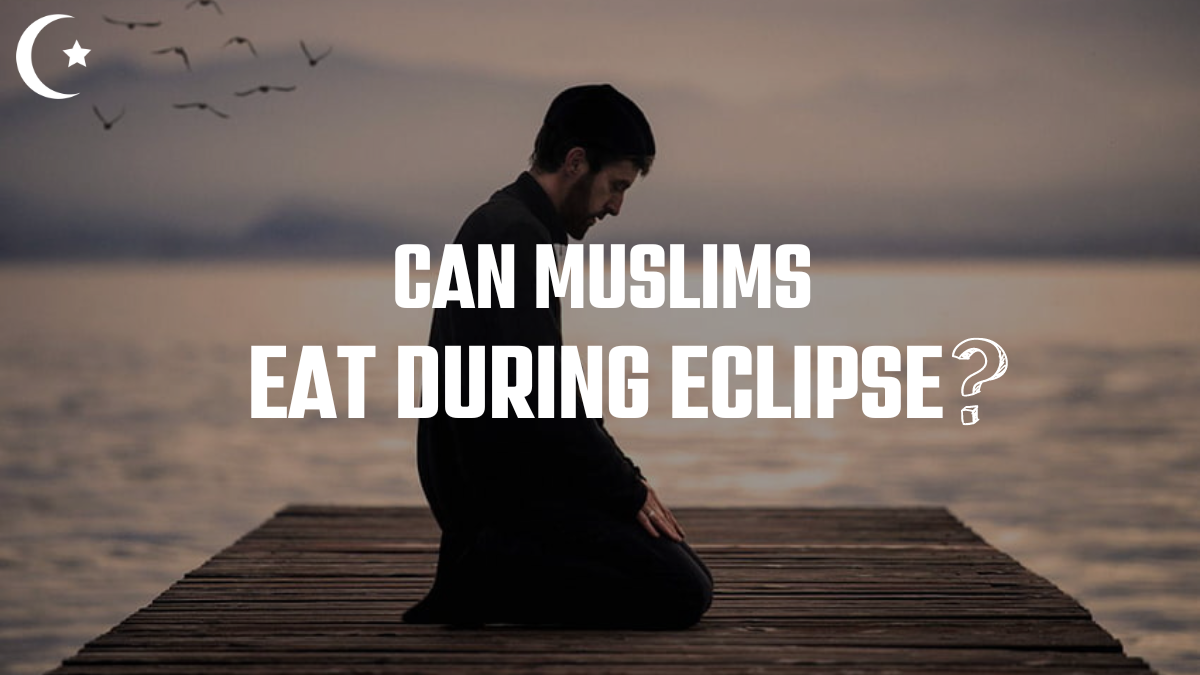As celestial events like solar and lunar eclipses captivate observers worldwide, a puzzling question emerges: Can Muslims eat during eclipse? This inquiry delves into the intricate tapestry of Islamic beliefs about eclipses and their cultural significance. Traditionally, these events invoke reflection and solemnity, not feasting.
This article seeks to unravel the complex interplay between religious practices and scholarly opinions. It looks at whether eating is allowed during these cosmic occurrences. With references from Hadith and historical context, we aim to address misconceptions. We want to enhance understanding of the practices in Islam related to eclipses.

Understanding Islamic Beliefs About Eclipses
In Islamic beliefs, eclipses are seen as deep spiritual events. They make people think deeply about faith. The story of Prophet Muhammad’s son, Ibrahim, in 632 CE, shows how important eclipses are. The Prophet taught that Allah is powerful and told Muslims to pray during eclipses.
The eclipse spiritual meanings are reflected in a special prayer called Ṣalāt al-kusūf. This prayer starts with two rak‘ahs and includes readings from Sūrat al-Baqarah, the longest chapter in the Qur’an.
This prayer is more than just a ritual. It reminds us of life’s shortness and Allah’s power. Muslims see eclipses as signs of Allah’s greatness. They use these moments to focus on faith and connect with the divine.
For example, during the August 2017 solar eclipse, the Central Illinois Mosque & Islamic Centre held the prayer. This act brought the community together. It showed the beauty of creation and the need for remembrance.
It led to more thinking and stronger bonds with others. Islamic teachings encourage us to think about our actions and our role in society. Eclipses are times to reflect on being good and fulfilling our duties.
Cultural Significance of Eclipses in Islam
Eclipses have a deep meaning in Islam, tied to Muslim traditions and beliefs. They are seen as more than just astronomical events. They offer a chance for people to come together, pray, and reflect spiritually. During eclipses, communities perform special prayers, called Salat al-Khusuf, to honor Allah’s greatness.
In the past, eclipses have led to interesting cultural practices in Muslim societies. For example, a rare double eclipse in Ramadan 1894 sparked talks about the Imam Mahdi’s prophecy. This event, known as “THE DARK DAY,” made people think deeply about faith and spirituality.
Muslims have always looked up to the sky with respect. The Quran mentions celestial bodies to remind us of Allah’s power. This shows how important eclipses have been throughout history and still are today.
Can Muslims Eat During Eclipse
Exploring whether Muslims can eat during an eclipse involves looking at scholarly opinions and cultural practices. The recent lunar eclipse caught the eye of many skywatchers. Now, with the next total lunar eclipse in 2024, the topic is still hot.
The Perspective of Scholarly Opinions
There are different views on eating during an eclipse. Some say to be careful and eat less during a lunar eclipse. But, many Islamic scholars believe there’s no rule against eating during these events. The Quran and Hadiths don’t clearly say not to eat during an eclipse.
Many say Muslims can eat before, during, or after an eclipse. They see eclipses as signs of Allah’s power, not superstitions.
Common Myths Versus Facts
Many myths about eating and eclipses spread, leading to confusion. Some think food is bad during an eclipse, but the Quran and Hadith don’t support this. Instead, eclipses are times for prayer and thinking deeply, as the Prophet Muhammad taught.
It’s also a myth that you must stay indoors or avoid certain activities. In reality, focus on praying and enjoying the beauty of the eclipse.
Religious Practices During Eclipses
Eclipses are deeply meaningful for many Muslims, leading to special religious acts. They focus on spiritual growth, not just avoiding food. These events encourage people to pray and reflect, deepening their faith.
The Role of Prayer and Reflection
Prayer and reflection are key during eclipses. Muslims come together for special prayers, strengthening community ties. They seek forgiveness and try to understand their bond with Allah.
Praying during eclipses helps people think about their faith and the beauty of creation. Seeing eclipses as signs from above helps believers grow spiritually through thought.
Acts of Worship During an Eclipse
During eclipses, Muslims perform special prayers and supplications. Mosques are filled with people coming together. These acts of worship show thanks and devotion.
They also help people refresh their faith. Seeing eclipses as chances to deepen faith highlights the role of worship in daily life and during big events.
You may also be interested in:
Historical Context of Eating During Eclipses
The history of eating during eclipses shows a mix of cultural, religious, and historical views. Different cultures have seen eclipses as signs or messages from the divine. This has led to unique ways of handling them, especially in Islamic traditions.
“Eclipses are signs of God, and not the death of someone.” – Prophet Muhammad
In early Islam, eclipses made people pray and think deeply. But opinions on them varied a lot. People often fasted and avoided certain activities as a sign of respect. Many thought eating during an eclipse could bring bad luck, so they avoided it.
This habit of not eating was more about cultural beliefs than strict rules. Scholars say these beliefs came from culture, not the Bible or religious texts.
Looking into the history of eating during eclipses helps us understand how people connect their beliefs with everyday life. It shows how humans try to find meaning in the natural world.
Scientific Explanation of Eclipses
Eclipses are amazing events that happen when celestial bodies line up just right. This setup, called syzygy, can cause light to be blocked. Scientists see eclipses as natural events, not magical ones. They help us understand the universe better and clear up old myths.
Studying eclipses in astronomy is key. It’s all about the paths of the Earth and the Moon. A solar eclipse happens when the Moon gets in the way of the Sun’s light. A lunar eclipse occurs when the Earth blocks the Sun’s light from reaching the Moon. Where people are on Earth and the Moon’s path play big roles in when and how we see eclipses.
Learning about eclipses shows us their beauty and the complex dance of celestial bodies. Seeing an eclipse can make us wonder about the universe. It lets us appreciate the beauty of nature without fear, moving past old superstitions.

Spiritual Significance Beyond the Physical
Eclipses in Islamic thought mean more than just what we see in the sky. Muslims are encouraged to think deeply during these times. They use eclipses to ponder creation, existence, and Allah’s power. These events remind us of life’s shortness and our final judgment on the Day of Resurrection.
The meaning behind eclipses is deeply rooted in Islamic teachings. Hadiths say eclipses are signs from Allah, meant to bring believers closer to Him. During eclipses, Muslims pray and ask for forgiveness, following the Prophet Muhammad’s teachings. This connection makes us think about our lives and our purpose.
Eclipses make us question our existence. They fill us with wonder, showing us Allah’s creation and encouraging us to seek knowledge. Muslims believe in understanding these events scientifically, without superstition. This shows the value of thinking rationally about the world.
Learning from eclipses, Muslims can reflect and renew their faith. This makes the spiritual significance eclipses more than just belief. It’s a way to understand and connect with the Divine better.
For more on how different cultures view eclipses, check out the many meanings of solar eclipses. These have various interpretations in different societies.
Modern Interpretations and Practices
Modern practices eclipse Islam with a mix of new views and old traditions. Some Muslims stick to their ancient customs, seeing the eclipse prayer, or “kusuf,” as key to their faith. This shows how Islam changes with culture and science.
Views on eating during an eclipse vary among Muslims. Some still fast, while others adjust their habits to fit modern life. This shows how religious beliefs change with society.
Many religions, like Hinduism and Judaism, also update their beliefs to fit today’s world. This creates a rich mix of spirituality during eclipses.
These new views add to the ongoing discussion on eclipses. They blend old faith with today’s reality. As the world gets more connected, the mix of faith and science shapes our spiritual lives.
Conclusion
Exploring the link between Muslims and eclipses shows us that eating during these events is complex. Old teachings and new views focus more on spiritual thoughts than food rules. They suggest worshipping and acts of respect, like the Solar Eclipse Prayer, during these times.
With the solar eclipse on April 8, 2024, coming up, praying and remembering Allah is key. Muslims are urged to pray, give to charity, and think deeply. This shows that eating during eclipses is less about rules and more about their deep spiritual meaning.
Watching an eclipse is a chance for Muslims to be more mindful and devoted. When the sun hides, believers see Allah’s greatness and focus on their inner selves. They do this through prayer and being kind. So, the moon and sun’s dance reminds us to practice spiritually during these special times.
FAQ
Can Muslims Eat During Eclipse?
What are the Islamic beliefs about eclipses?
Are there cultural practices associated with eclipses in Islam?
What is the perspective of scholarly opinions on eating during an eclipse?
What are the common myths versus facts regarding eating during eclipses?
What religious practices occur during eclipses?
What is the historical context surrounding eating during eclipses?
What is the scientific explanation of eclipses?
What is the spiritual significance of eclipses beyond the physical?
How have modern interpretations and practices surrounding eclipses evolved?

Embracing Faith, One Insight at a Time!
The teachings of the Quran have always guided my path. With a deep passion for Islamic knowledge, I strive to blend the wisdom of tradition with the relevance of today, making the timeless messages of Islam accessible and meaningful for everyone.
Muslim Culture Hub is my platform to share historical insights and thought-provoking articles, exploring both well-known and lesser-discussed aspects of Islamic culture and beliefs. My mission is to create an inclusive online space where everyone can learn, strengthen their faith, and connect with the profound message of Islam.
Join the journey!
May peace be upon you.








